
Hamburg: A City of Maritime Grandeur and Modern Vibrancy
Explore Hamburg, Germany's vibrant port city: Discover maritime history, modern architecture, and a thriving cultural scene in this captivating metropolis.
Hamburg, Germany's second-largest city, is a captivating blend of historical significance and contemporary allure. As a major port city, Hamburg boasts a rich maritime heritage evident in its stunning architecture, canals, and world-class museums. Explore the UNESCO-listed Speicherstadt, a historic warehouse district, or marvel at the modern Elbphilharmonie concert hall. Delve into the city's past at the Hamburg History Museum or take a stroll along the vibrant Reeperbahn. With its diverse cultural scene, thriving nightlife, and picturesque waterways, Hamburg offers an unforgettable experience for every traveler. From its historical landmarks to its modern attractions, Hamburg seamlessly blends the old and new, creating a unique and captivating destination.
A brief summary to City of Hamburg Germany
- Hamburg, Hamburg-Mitte, DE
Local tips
- Take a harbor tour to experience the impressive scale of the Port of Hamburg and learn about its maritime history.
- Visit the Speicherstadt, a UNESCO World Heritage Site, to explore the historic warehouse district and its intricate network of canals.
- Attend a concert at the Elbphilharmonie for a world-class musical experience and stunning views of the city.
- Explore the Reeperbahn, Hamburg's famous entertainment district, for a taste of the city's nightlife.
- Visit the Fischmarkt on a Sunday morning for fresh seafood and a lively atmosphere.
Getting There
-
Public Transport
Hamburg boasts an excellent public transportation system. From Hamburg Hauptbahnhof (main train station), take the U-Bahn (subway) lines U1 or U3 to stations within the city center. Alternatively, several S-Bahn (suburban train) lines also serve central locations. A single ticket within the central zones (Rings A and B) costs approximately €3.60. Day tickets are available for €8.40, offering unlimited travel within the same zones. Consider purchasing a Hamburg Card for discounts on attractions and free public transport.
-
Taxi/Ride-Share
Taxis and ride-sharing services (like Uber or Bolt) are readily available throughout Hamburg. A short taxi ride from Hamburg Hauptbahnhof to the Rathausmarkt (city hall) would typically cost between €12 and €18, depending on traffic. Be aware that during peak hours, ride-sharing prices may surge.
-
Walking
Many of Hamburg's central attractions are within walking distance of each other. From Hamburg Hauptbahnhof, it's a pleasant 15-20 minute walk to the Rathausmarkt, passing along the Mönckebergstrasse shopping street. Walking allows you to soak in the city's atmosphere and discover hidden gems along the way.
-
Driving
Driving in Hamburg's city center can be challenging due to traffic and limited parking. If driving, follow signs for 'Centrum' or specific attractions. Parking is available in various garages, with hourly rates ranging from €3 to €4 and daily maximums around €25. Consider using Park & Ride facilities outside the city center and taking public transport for the final leg of your journey.
Discover more about City of Hamburg Germany
Iconic landmarks you can’t miss
City of Hamburg Germany
0.0 km
Explore Hamburg, Germany's vibrant port city: Discover maritime history, modern architecture, and a thriving cultural scene in this captivating metropolis.
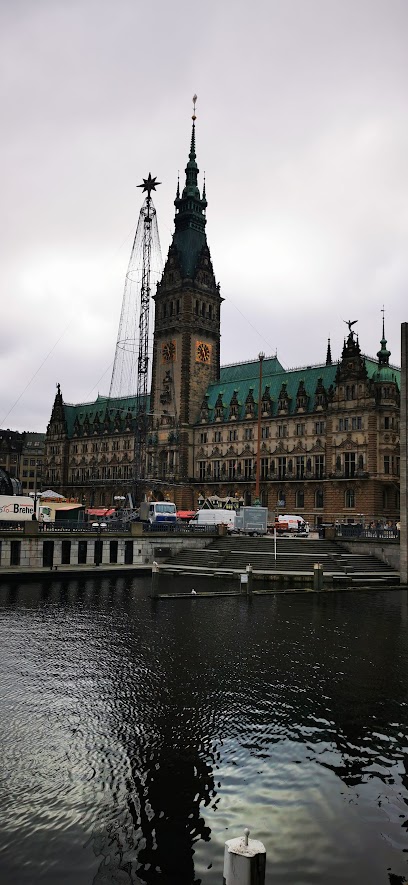
St. Nikolai Museum
0.3 km
Explore the ruins of St. Nikolai, a WWII memorial in Hamburg, offering panoramic city views, a poignant museum, and a carillon, fostering remembrance and reflection.
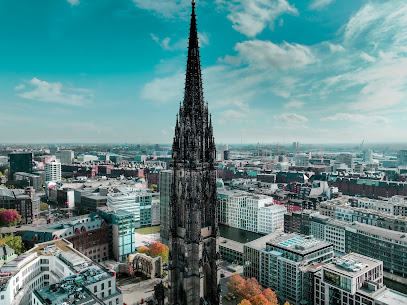
Deichstraße
0.3 km
Discover Hamburg's oldest street, a picturesque lane of meticulously restored 17th-19th century houses along the Nikolaifleet, offering a glimpse into the city's Hanseatic past.
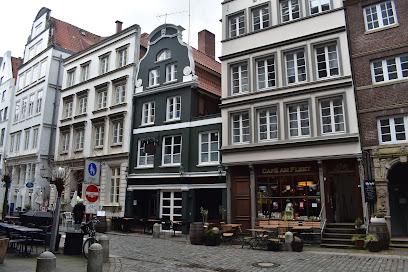
Trostbrücke
0.4 km
Cross the Trostbrücke in Hamburg, where history whispers from every stone, connecting you to the heart of the city's Hanseatic past and offering stunning views of the Nikolaifleet.
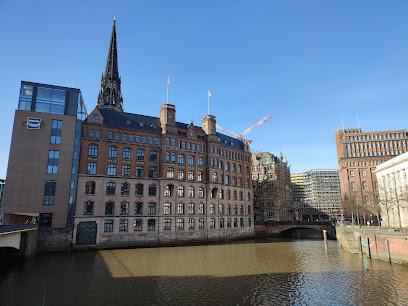
Hygieia Fountain
0.4 km
Discover the Hygieia Fountain in Hamburg's City Hall: a symbol of resilience and a tribute to the city's triumph over the cholera epidemic of 1892, embodying Hamburg's enduring spirit.
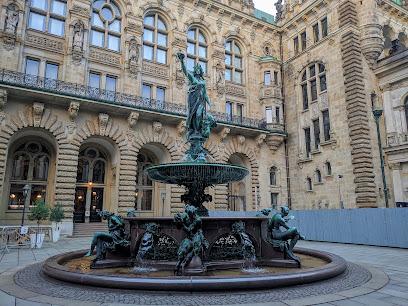
Mattentwiete 2
0.4 km
Discover Hamburg's maritime soul from Mattentwiete 2: Gateway to the UNESCO World Heritage Speicherstadt, a captivating blend of history, architecture, and culture.
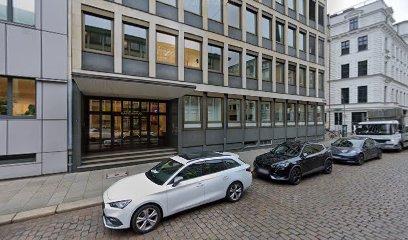
Kleines Dock
0.4 km
Discover Hamburg's maritime heart at Kleines Dock: historic Deichstraße, Hanseatic architecture, waterfront charm, and culinary delights await near the Speicherstadt.
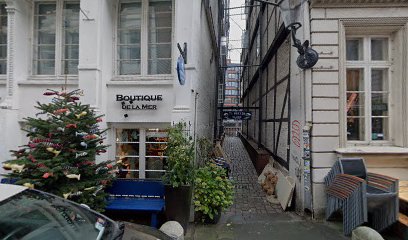
House of Seafaring
0.4 km
Explore Hamburg's maritime heritage at the House of Seafaring, a historical landmark showcasing the city's rich nautical past and stunning architecture in the heart of Hamburg-Mitte.
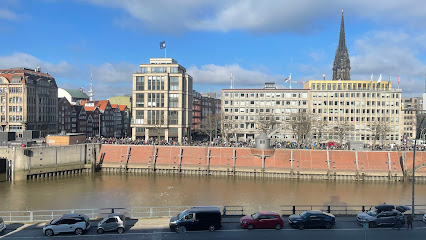
Hohe Brücke
0.4 km
Cross the historic Hohe Brücke in Hamburg's Old Town for stunning canal views and a glimpse into the city's rich maritime past, connecting you to the heart of Hamburg.
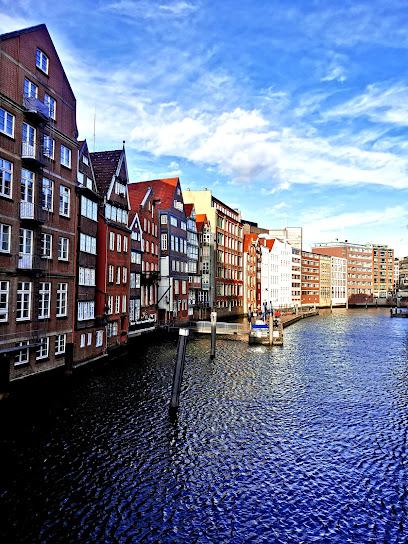
Hohe Brücke 2
0.4 km
Discover Hamburg's maritime history and architectural beauty at the Hohe Brücke, a picturesque bridge offering stunning views of the Nikolaifleet and the historic Deichstraße.
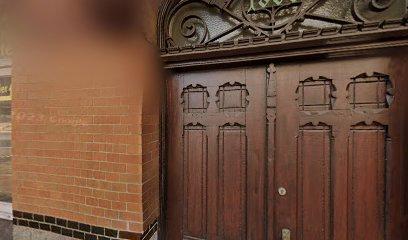
Rathausmarkt
0.5 km
Discover the Rathausmarkt in Hamburg: a historic square, architectural marvel, and vibrant hub for events, culture, and Hanseatic charm in the heart of the city.
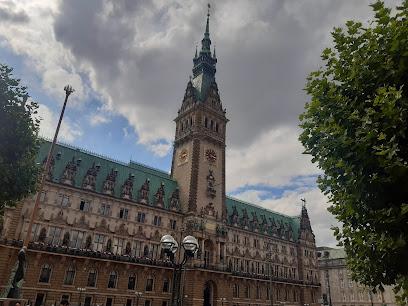
Denkmal für die Gefallenen beider Weltkriege
0.5 km
A poignant memorial in Hamburg-Mitte honoring the fallen of both World Wars, featuring Ernst Barlach's moving sculpture and offering a space for reflection and remembrance.
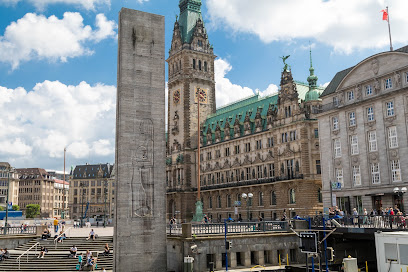
Heinrich Heine Monument
0.5 km
A poignant tribute to the celebrated German poet Heinrich Heine, commemorating his legacy of literary brilliance and his struggles against intolerance, located in the heart of Hamburg.
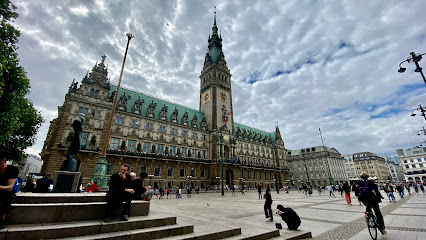
Alte Post
0.5 km
Explore the Alte Post in Hamburg: a historic landmark blending stunning architecture with a vibrant shopping experience in the heart of the city's Passagenviertel.
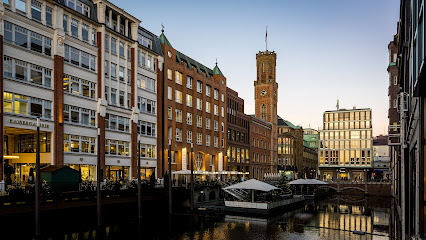
Brooksbrücke
0.5 km
Experience the historical charm and stunning views at Brooksbrücke, a must-visit bridge in Hamburg that connects culture and beauty.
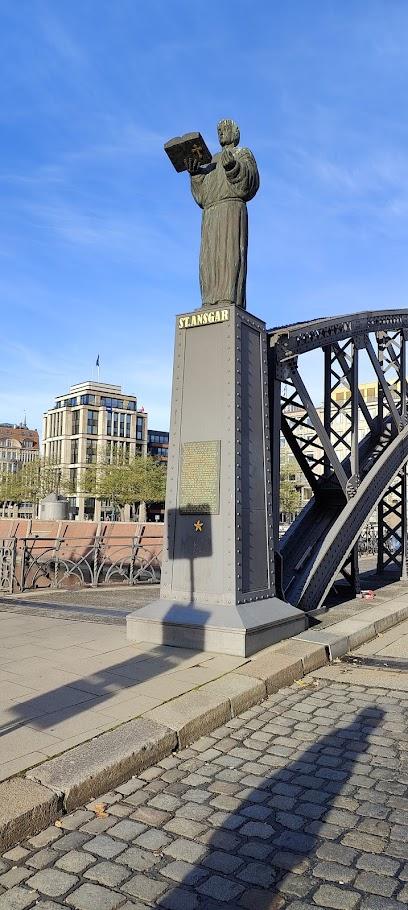
Unmissable attractions to see
Hopfenmarkt
0.2 km
Experience the vibrant atmosphere of Hopfenmarkt, Hamburg's lively town square filled with history, culture, and local charm.

St. Nikolai Memorial
0.3 km
Explore the St. Nikolai Memorial in Hamburg, a breathtaking monument reflecting resilience and rich history, offering panoramic views of the city.
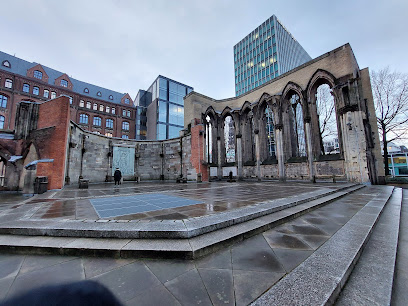
Börsentag Hamburg
0.3 km
Explore the fascinating world of finance at Börsentag Hamburg, an engaging exhibition center in the heart of one of Germany's vibrant cities.
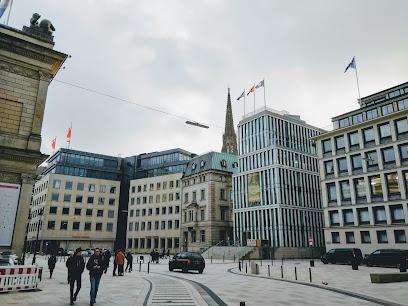
Bucerius Kunst Forum
0.3 km
Explore Bucerius Kunst Forum, an art museum in Hamburg showcasing diverse exhibitions, concerts, and cultural events in a stunning architectural setting.
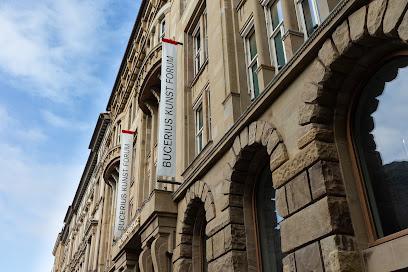
Bleichensteg
0.4 km
Explore the picturesque Bleichensteg in Hamburg, a tranquil oasis of beauty, history, and culture perfect for leisurely strolls and stunning photography.
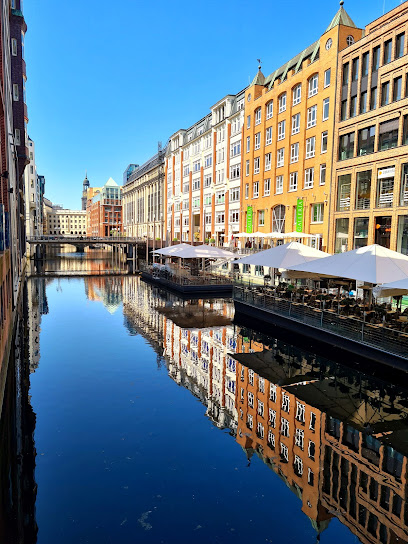
Hamburg Townhall
0.4 km
Explore Hamburg Townhall, a stunning historical landmark blending architectural beauty with rich history in the heart of Hamburg.
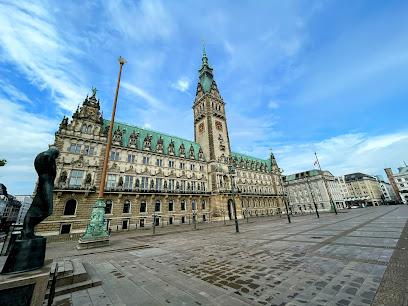
scuddy.tours
0.4 km
Discover Hamburg’s hidden gems and iconic sights with Scuddy Tours, your ultimate guide to unforgettable experiences in the city.

Brunnen
0.5 km
Experience the serene beauty and cultural significance of Brunnen, a delightful tourist attraction in the heart of Hamburg.
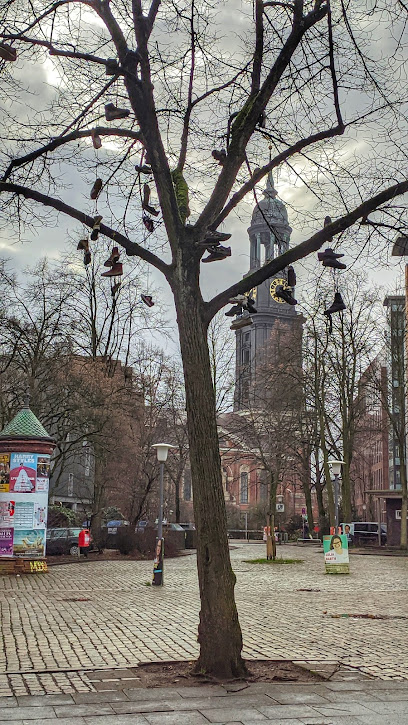
Mellinpassage
0.5 km
Experience the charm of Mellinpassage, Hamburg's elegant shopping center featuring high-end boutiques, cafés, and art galleries in a stunning architectural setting.
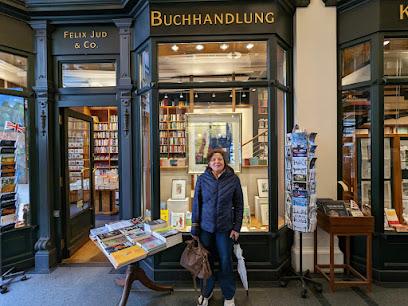
Hummel Memorial
0.5 km
Explore Hamburg's Hummel Memorial, a serene tribute to a musical legacy amidst the city's vibrant cultural scene.
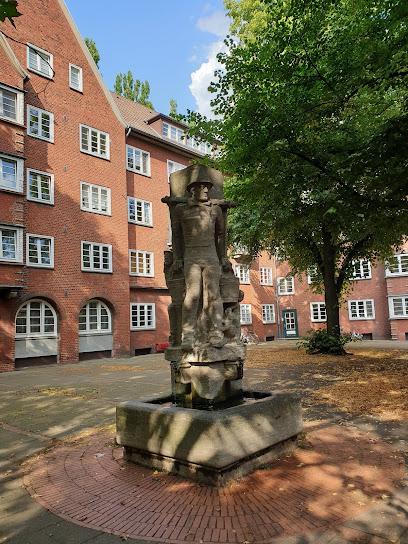
Alster Arcade
0.5 km
Explore the historic Alster Arcade in Hamburg, where stunning architecture meets vibrant shops and cafes along the picturesque canals.
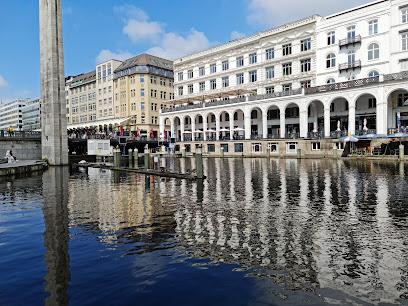
Alstermündung
0.5 km
Experience the serene beauty of Alstermündung, where the Alster River meets the Elbe in a scenic escape within Hamburg.
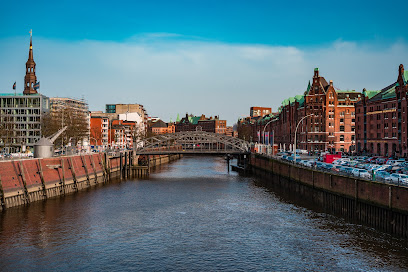
St. Michael's Church
0.6 km
Explore the stunning architecture and rich history of St. Michael's Church in Hamburg, a cultural and spiritual landmark with breathtaking views.

Miniatur Wunderland
0.6 km
Explore Miniatur Wunderland, the world's largest model railway in Hamburg, showcasing breathtaking landscapes and intricate designs for all ages.
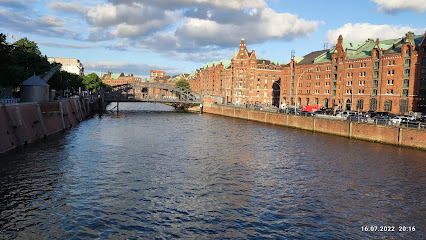
Hamburg Dungeon
0.6 km
Explore Hamburg's dark past at the Hamburg Dungeon, where history comes alive through thrilling performances and immersive storytelling.
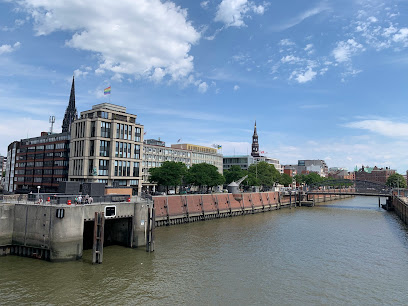
Essential places to dine
THE DINING RooM
0.1 km
Discover the exquisite flavors of American, French, and German cuisine at The Dining RooM in Hamburg - a fine dining experience like no other.
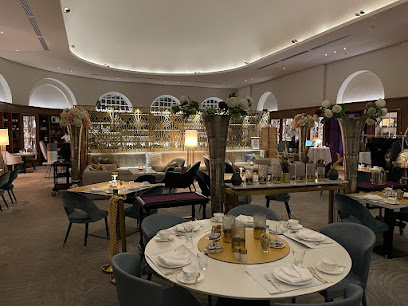
Restaurant Rialto
0.2 km
Experience the flavors of Hamburg at Restaurant Rialto - where tradition meets modern cuisine in a charming atmosphere.
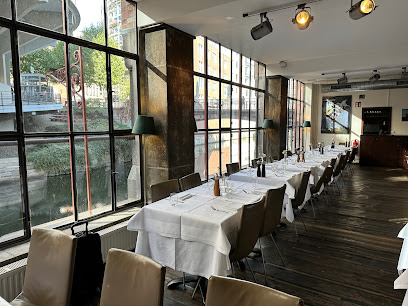
Restaurant Kartoffelkeller
0.3 km
Savor authentic German flavors at Restaurant Kartoffelkeller in Hamburg – a delightful culinary experience awaits!
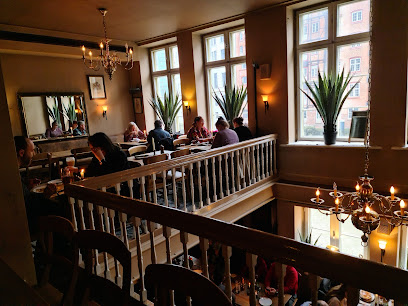
chez l'ami TORTUE
0.3 km
Experience exquisite French cuisine at Chez l'ami TORTUE in Hamburg – where culinary tradition meets modern elegance.
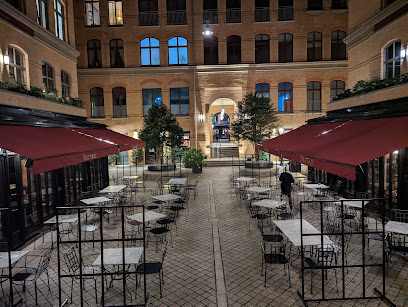
Deichgraf Restaurant
0.3 km
Experience exquisite dining at Deichgraf Restaurant in Hamburg—where fresh local ingredients meet culinary artistry.
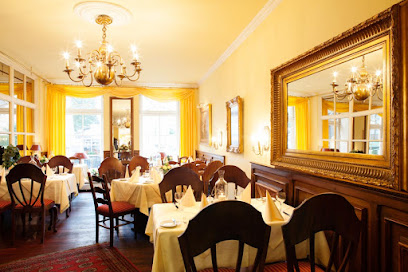
brasserie TORTUE
0.3 km
Experience exquisite French dining at Brasserie TORTUE in Hamburg—where culinary artistry meets elegant ambiance.
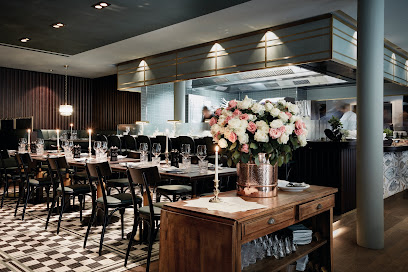
Restaurant Porticello
0.4 km
Experience authentic Italian cuisine in Hamburg at Restaurant Porticello - where every dish tells a story.
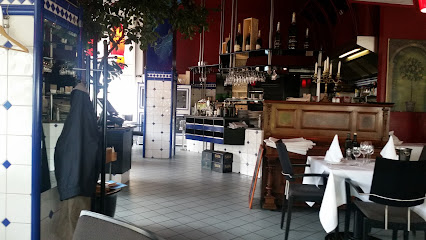
Restaurant Parlament Hamburg
0.4 km
Discover authentic German cuisine at Restaurant Parlament in Hamburg, where tradition meets modern dining in a historic setting.
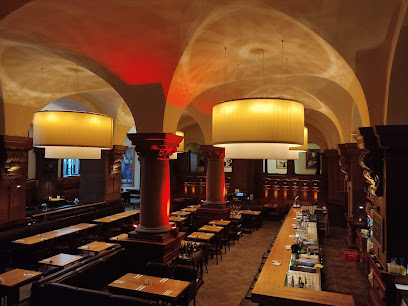
I Vigneri Osteria Enoteca
0.4 km
Experience authentic Marche cuisine at I Vigneri Osteria Enoteca in Hamburg, where exquisite dishes meet an extensive wine selection.
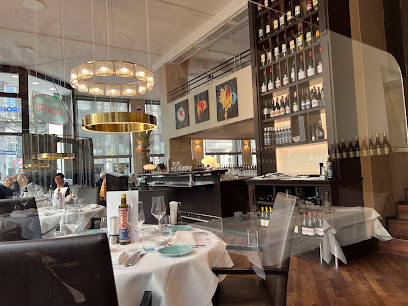
Le Plat du Jour
0.5 km
Discover authentic French cuisine at Le Plat du Jour in Hamburg – where every dish tells a story of culinary excellence.
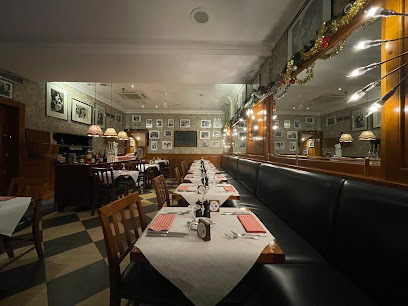
Krameramtsstuben
0.5 km
Discover Krameramtsstuben: A charming restaurant in Hamburg offering authentic European cuisine and an extensive wine selection amidst rich cultural heritage.
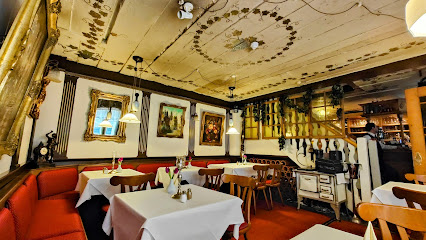
Restaurant Schoppenhauer
0.5 km
Savor the essence of Germany at Restaurant Schoppenhauer - where tradition meets taste in Hamburg.
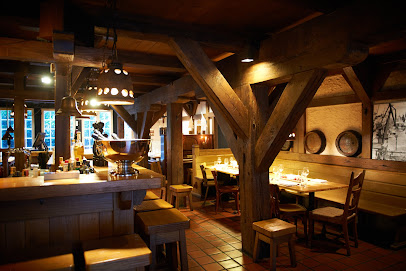
Restaurante Español Picasso
0.6 km
Experience authentic Spanish cuisine at Restaurante Español Picasso in Hamburg, where every dish tells a story from the Mediterranean.
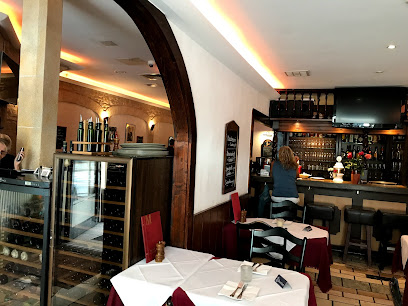
Restaurant Brook
0.6 km
Experience exquisite French and Mediterranean cuisine at Restaurant Brook in Hamburg – where every dish tells a story.
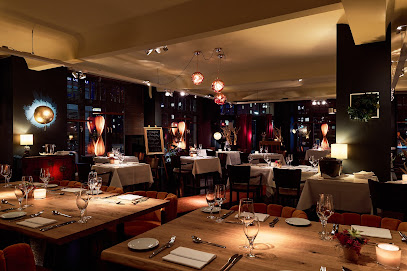
Heimathafen
0.6 km
Discover authentic German flavors at Heimathafen, where traditional cuisine meets vibrant atmosphere in the heart of Hamburg.
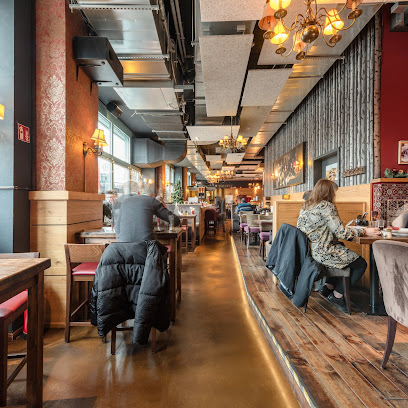
Markets, malls and hidden boutiques
wasted hour - concept store
0.1 km
Explore Wasted Hour in Hamburg - a concept store that redefines fashion with unique designs and an inspiring atmosphere.

CHANEL BOUTIQUE HAMBURG
0.2 km
Explore the luxury and elegance of CHANEL Boutique Hamburg, where timeless fashion meets exquisite craftsmanship in a stunning shopping experience.
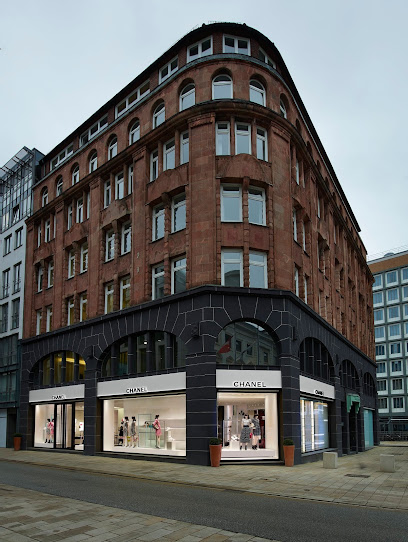
Gudrun Sjödén - concept store Hamburg
0.3 km
Explore Gudrun Sjödén's concept store in Hamburg for vibrant women's fashion, unique accessories, and a touch of sustainable style.

Montblanc Boutique Hamburg - Neuer Wall
0.3 km
Experience the epitome of luxury at Montblanc Boutique Hamburg, offering exquisite jewelry, leather goods, and fine stationery in a sophisticated setting.
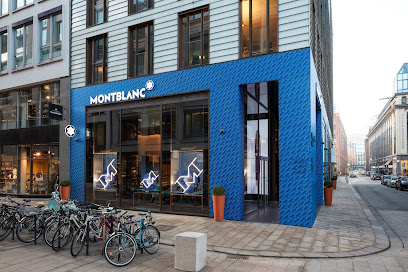
Boutique de la Mer -Ti Breizh
0.4 km
Explore unique fashion at Boutique de la Mer - Ti Breizh in Hamburg-Mitte, a stylish destination for clothing lovers and travelers alike.
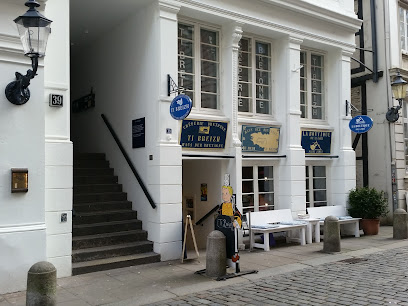
American Vintage
0.4 km
Explore the latest trends and unique styles at American Vintage, a chic clothing store in the heart of Hamburg, perfect for all fashion enthusiasts.
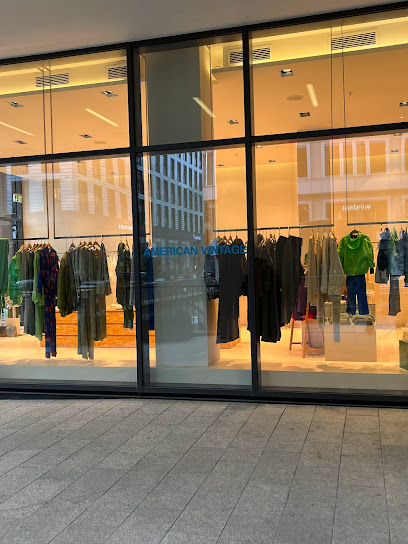
nosame GmbH
0.4 km
Explore nosame GmbH in Hamburg for unique gifts and stylish clothing that reflect the city's eclectic charm and creativity.

La plus belles rue
0.4 km
Explore Neuer Wall, Hamburg's luxurious shopping street, where high-end brands meet local craftsmanship in a picturesque setting.

PRADA Hamburg Neuer Wall Store
0.4 km
Explore the elegance of PRADA at Neuer Wall in Hamburg, where luxury fashion meets sophisticated style in a stunning retail environment.
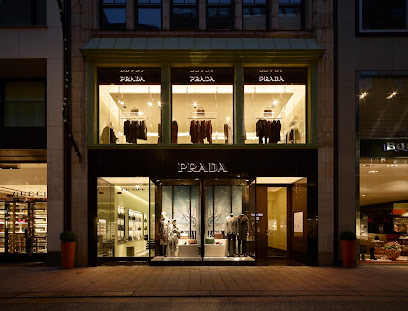
GALLERIA
0.5 km
Discover Galleria Hamburg: A luxurious shopping mall blending high-end fashion, delicious dining, and an elegant atmosphere in the heart of the city.

Hoi Lieblingsstücke
0.5 km
Explore Hoi Lieblingsstücke in Hamburg for unique gifts and souvenirs that capture the city's artistic spirit and local charm.
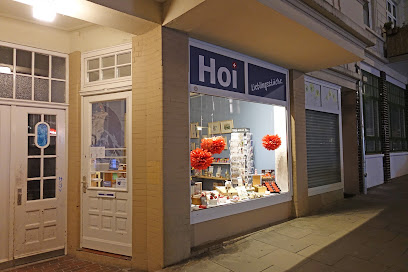
Hanseviertel
0.5 km
Discover Hanseviertel: Hamburg's premier shopping mall blending boutique stores, eateries, and a vibrant cultural atmosphere.
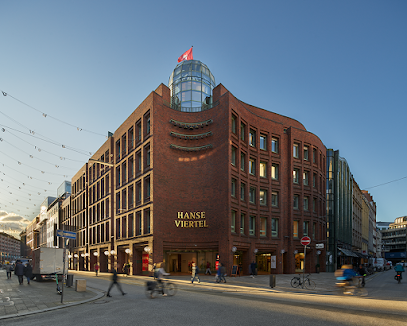
Frau Vogel – Erinnerungen an Hamburg
0.5 km
Explore Frau Vogel, Hamburg's enchanting gift shop, offering unique souvenirs and local crafts to capture the city's spirit.
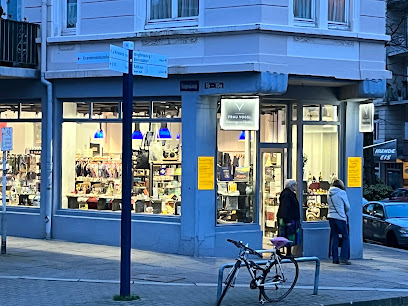
C'N'C
0.5 km
Explore the latest fashion trends at C'N'C, Hamburg's chic clothing store on the stunning Jungfernstieg promenade.
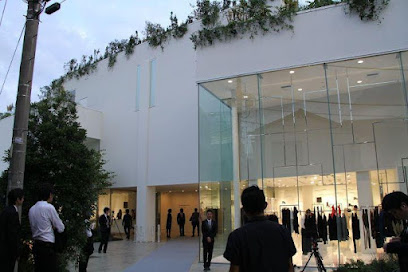
Alsterhaus
0.6 km
Discover the essence of luxury shopping at Alsterhaus, Hamburg's premier department store, offering fashion, fragrances, and fine dining experiences.
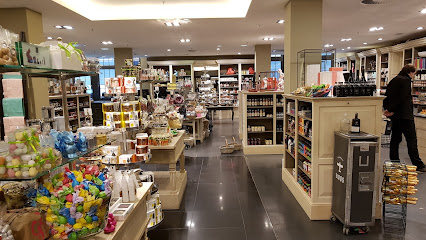
Essential bars & hidden hideouts
The Bohemian - Bar
0.3 km
Discover The Bohemian, Hamburg's premier cocktail bar, known for its signature drinks and vibrant nightlife in the heart of the city.

Irish Pub in the Fleetenkieker
0.3 km
Immerse yourself in the lively spirit of the Irish Pub in the Fleetenkieker, Hamburg, where great food, drinks, and live music await.
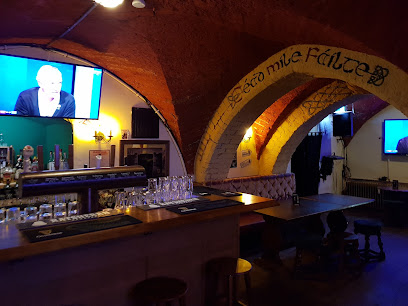
Whiskyplaza & Altstadt Restaurant am Fleet
0.4 km
Discover Hamburg's Whiskyplaza & Altstadt Restaurant, a culinary haven where fine dining meets an exquisite cocktail experience in a historic setting.
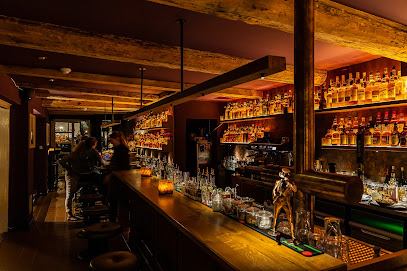
Paddy's Bar
0.5 km
Discover the vibrant atmosphere of Paddy's Bar, Hamburg's favorite Irish pub, offering hearty meals, a wide drink selection, and live music.
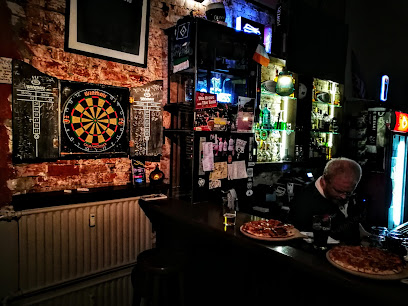
Ba Nomu | Bar
0.5 km
Discover Ba Nomu, Hamburg's cocktail haven, where creativity meets taste in a vibrant, stylish atmosphere perfect for unforgettable nights.

Le Lion • Bar de Paris
0.5 km
Discover the luxury of Le Lion • Bar de Paris, Hamburg's premier destination for exquisite cocktails and elegant ambiance.

Gugu Bar
0.6 km
Experience the vibrant nightlife of Hamburg at Gugu Bar, where eclectic decor meets an extensive drink menu in a lively atmosphere.
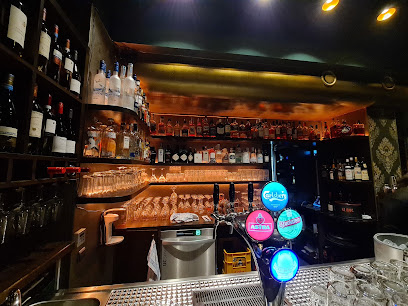
Meyer Lansky's
0.7 km
Discover the energetic spirit of Hamburg at Meyer Lansky's, where exquisite cocktails meet a lively atmosphere for an unforgettable night out.
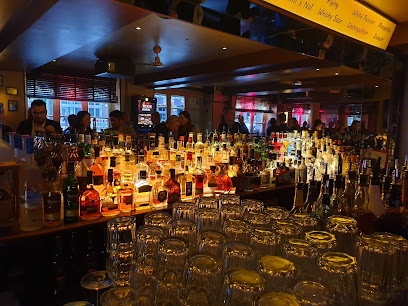
BLICK Bar Elbphilharmonie
0.8 km
Discover Hamburg's stunning skyline while enjoying exquisite cocktails at BLICK Bar Elbphilharmonie, a must-visit gem in the city's nightlife.
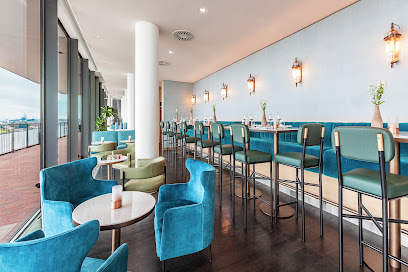
Three Fingers Bar
0.8 km
Experience the vibrant nightlife of Hamburg at Three Fingers Bar, where stunning waterfront views meet expertly crafted cocktails.
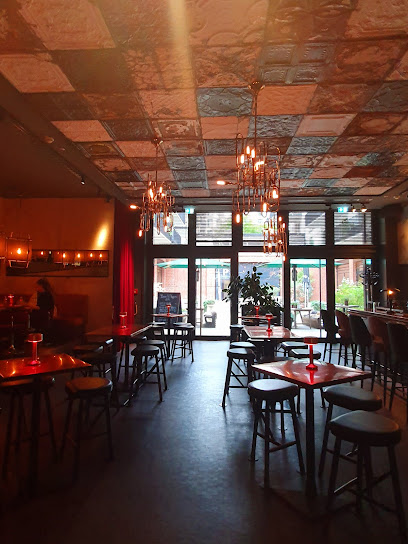
MOON 46
0.8 km
Discover the lively ambiance and exquisite cocktail selection at MOON 46, a must-visit bar in Hamburg's vibrant nightlife scene.
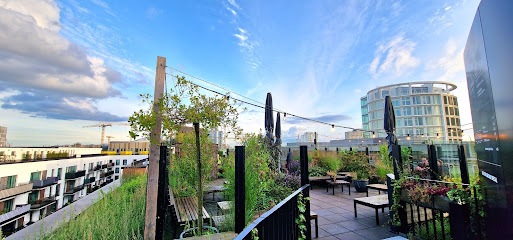
Liquid Garden - Cocktailbar
0.9 km
Discover Liquid Garden, Hamburg's vibrant cocktail bar where creativity and flavor blend for unforgettable nights and unique drinks.

Club 20457
1.0 km
Experience Hamburg's vibrant nightlife at Club 20457, where art meets music in a lively bar setting.
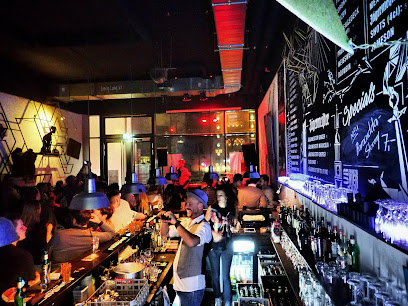
CIU` DIE BAR
1.0 km
Discover CIU` DIE BAR in Hamburg for innovative cocktails, a stylish atmosphere, and an unforgettable nightlife experience.
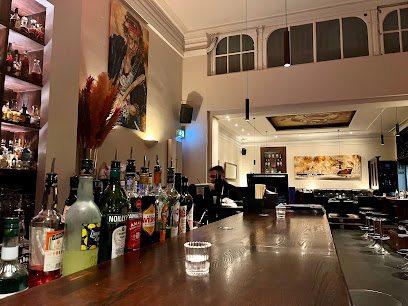
Tipsy Baker Bar Hamburg
1.0 km
Discover the best drinks and vibrant nightlife at Tipsy Baker Bar, Hamburg's favorite spot for cocktails and socializing.

Nightclubs & after hour spots
Cotton Club
0.4 km
Discover the soulful sounds of live jazz at the Cotton Club, Hamburg's premier jazz venue for an unforgettable night out.
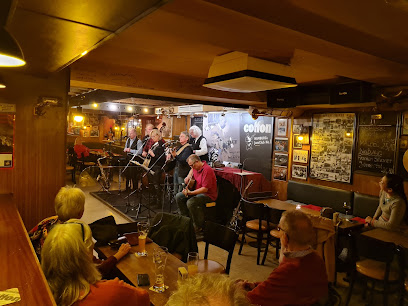
Chilli Club
0.8 km
Experience the vibrant flavors of Asia at Chilli Club, Hamburg's premier destination for sushi and authentic Asian cuisine.
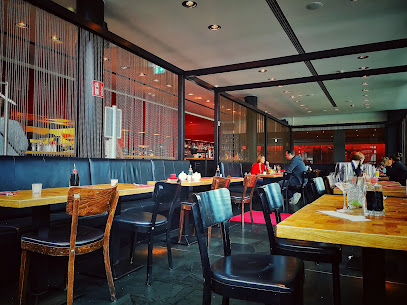
Die Insel Hamburg
1.1 km
Die Insel Hamburg: A premier night club offering an electrifying nightlife experience in the heart of the city, perfect for dancing and socializing.
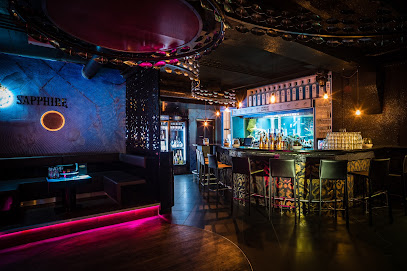
Baalsaal - Hamburg
1.4 km
Experience the heart of Hamburg's nightlife at Baalsaal, a vibrant night club on Reeperbahn with an electric atmosphere and unforgettable parties.

The Room Bar & Club
1.4 km
Experience the vibrant nightlife at The Room Bar & Club in Hamburg, where music, dancing, and cocktails come together for an unforgettable evening.
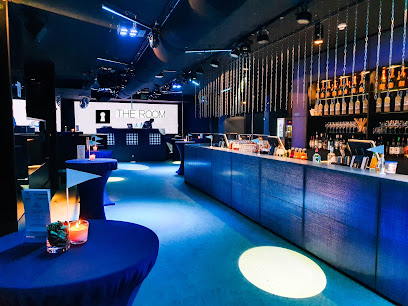
Terrace Hill
1.4 km
Discover the heart of Hamburg's nightlife at Terrace Hill, where unforgettable dance experiences and electric music await every night.
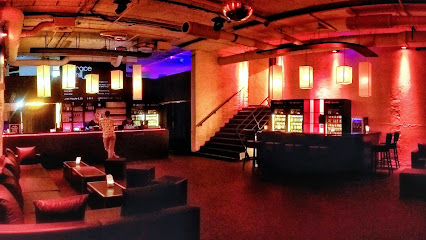
Golden Cut - Hamburg
1.5 km
Experience the electrifying nightlife at Golden Cut, Hamburg's premier night club, where music and energy collide for an unforgettable evening.

Summer Salon in the clubhouse
1.5 km
Experience the pulsating nightlife of Hamburg at Summer Salon, where live music, cocktails, and a vibrant beer garden await you.
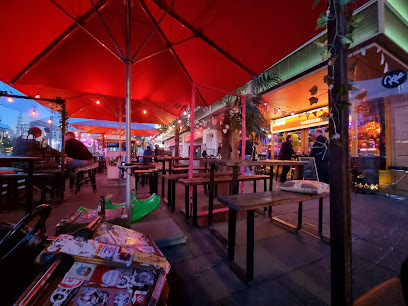
GAGA
1.5 km
Discover the pulsating energy of GAGA, Hamburg's premier night club, where dining meets vibrant nightlife and live music ignites the dance floor.
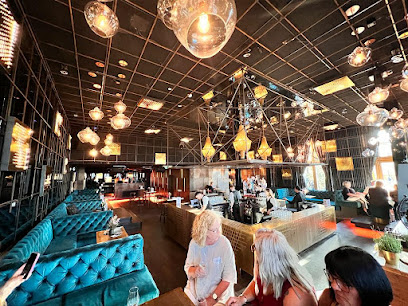
Cave Club & Lounge
1.5 km
Experience the electrifying atmosphere of Cave Club & Lounge, a premier disco in Hamburg's iconic Reeperbahn, where unforgettable nights await.
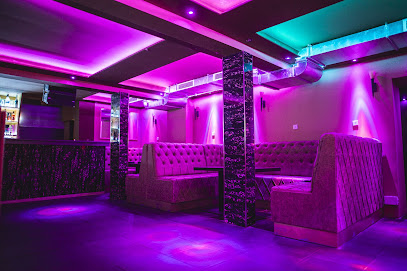
GeizClub
1.6 km
Experience Hamburg's nightlife at GeizClub, a premier nightclub known for its vibrant ambiance, diverse music, and unforgettable nights out.
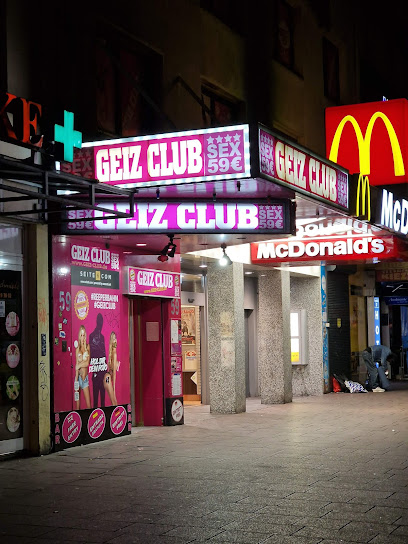
Angie's
1.6 km
Experience the vibrant nightlife at Angie's, Hamburg's premier live music venue and night club, where every night promises unforgettable entertainment.
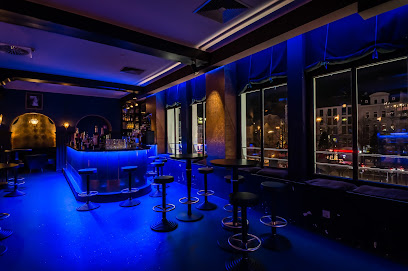
Volt
1.6 km
Discover the electrifying atmosphere of Volt, Hamburg's premier night club, known for its vibrant techno parties and unforgettable nightlife experience.
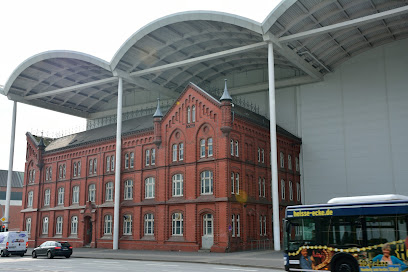
Inside 80s Club - Hamburg
1.7 km
Experience the pulsating energy of the 80s at Inside 80s Club in Hamburg, where unforgettable nights of dancing and nostalgia await.

scandinavian club
1.7 km
Discover the energetic atmosphere of Scandinavian Club, a premier night club in Hamburg offering diverse music and vibrant nightlife experiences.




